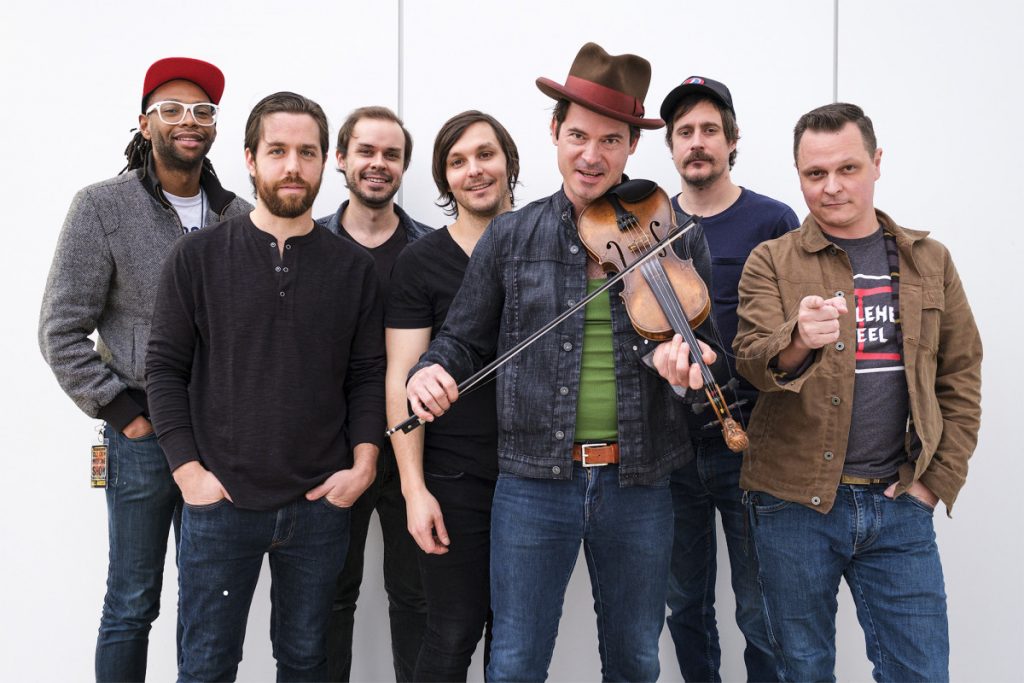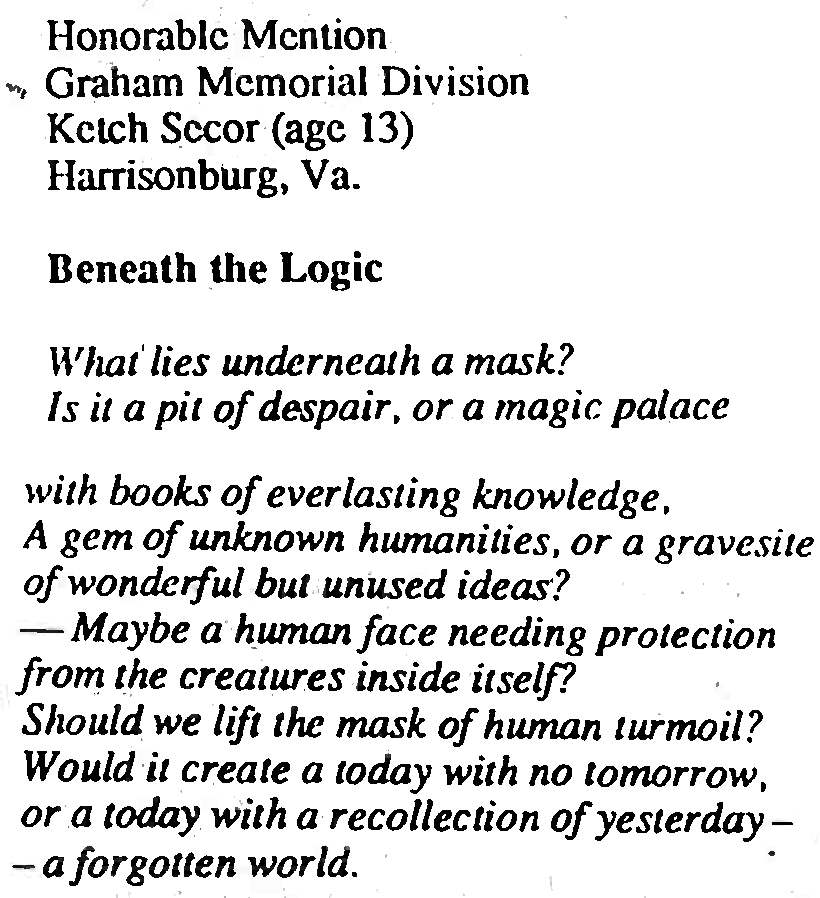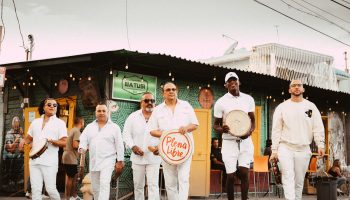SARA TOTH – EDITOR

The primary function of a musician, in Ketch Secor’s estimation, is to be a merrymaker.
“This is the job we sign up for — as musicians, we ride across America and bring live music to people,” he said. “That’s the job description. … As merrymakers, we go out, hit the road. And it’s really hard to be a merrymaker on a Zoom call.”
Secor, in addition to being a vocalist, plays the fiddle, harmonica, guitar and banjo for the Americana string band Old Crow Medicine Show — back on the road with a stop scheduled at 8:15 p.m. Thursday, Aug. 26 in the Amphitheater.
Secor said the band tries to play music that reflects where they are geographically — so Wednesday’s show in LaFayette, New York, just south of Syracuse and Lake Erie, might have featured “Low Bridge,” with the refrain of “15 years on the Erie Canal.” He’s not sure what the set list for Chautauqua might look like, but “we try to find those common denominators between the audience and the music to remind them that the music belongs to them.”
“One of the tenets of the band is that we attempt to be the hometown boys in every town,” Secor said. “What allows us to at least pretend to do that is that we play this American folk music, which really does come from every place.”
This is Old Crow Medicine Show’s first time playing Chautauqua, but it’s not Secor’s first time on the grounds. His great-great-aunt was a Chautauquan for most of her life, Secor said, and he visited her here in 1991, when he was 13. He remembers seeing the satire group Montana Logging and Ballet Company perform in the Amp, and that same summer he entered the Chautauqua Women’s Club 62nd Annual Poetry Contest, earning an honorable mention in the Elfreda Graham Memorial Division for poets under the age of 16. (His poem was titled “Beneath the Logic,” and was published in the Daily on Aug. 24, 1991.)
Seven years after his first visit to Chautauqua, Secor and Old Crow Medicine Show got their start in 1998, busking in New York state and through Canada. Since then, the band’s released six studio albums, won two Grammy Awards and were inducted as members of the Grand Ole Opry. Their single “Wagon Wheel” received the Recording Industry Association of America double-platinum certification in 2019 for selling more than 2 million copies since its release in 2004.
“It was really kind of a slow growth, you know. Every time we would come to your town, there would be 150 more people, 300 more people,” Secor said. “It was really a word-of-mouth thing, because we weren’t on the radio or the TV in any meaningful way. Mostly it was just that people liked our songs and sang them around summer camps and campfires. You get enough people doing that, you might get yourself a career.”
Secor said it was a “love affair with the United States” that got him into this business, and what still sustains him. He traveled a lot when he was a kid and wanted to keep traveling as a young man and as an adult.

“The books I read spurred me on, too,” he said. “They made me want to go see the places that felt full of magic and mystery, all across the continent, as a traveler and musician. I’ve been able to be in all these places and see people at their best — people in a gregarious flock, singing along together.”
To him, that’s “the antidote” to the troubles of the world — troubles that he sees as part of a “continuum of the troubling tendencies of our species. War, discord; those things are always there. But another thing that’s always there is unity, and song.”
One of those songs, released last June, is “Pray For America,” written in eight days for NPR’s “Morning Edition” Song Project. Old Crow Medicine Show was the first band to participate in the series, and Secor tried to put his feelings about the pandemic, mask mandates and politics “into a sermon that could be for everybody, and not just the people who think like I think.”
He told NPR he wanted to write a song that “felt like ‘God Bless America,’ but I also wanted to have a little ‘This Land is Your Land,’ too. I think we, as songwriters, got to keep adding to the canon of songs about America because we need to update it. These are troubling times, and we need new songs about our country to inspire unity.”
Old Crow Medicine Show has solidified its place in that American canon and tradition of songwriters, and there may be no better example of that canon’s growth and evolution than the band’s hit “Wagon Wheel.”
“Some songs are magical,” Secor said. “They don’t just come out of your pen. Some songs that go No. 1 simply aren’t magical — that’s not a prerequisite. But magic songs belong to the people who sing them. They get passed along, and they get scuffed up along the way and are reshaped.”
Secor first heard Bob Dylan’s bootleg version of “Wagon Wheel” when he was 17 — it was about 36 seconds long, titled “Mama Rock Me,” with a mumbled, hard-to-decipher verse. Secor heard the song, wrote his own verses to it, and immediately thought, “Wow, this is a good one.” And then it took him 10 years to bring it out into the world.
To release the song, the band needed Dylan’s permission. When they finally got in touch with Dylan’s management, they responded: “Well, Bob was flattered. But he didn’t write the song.”
Dylan learned the song from Delta blues singer-songwriter Arthur “Big Boy” Crudup — the same man who wrote Elvis Presley’s debut hit “That’s All Right.” So Secor listened to Crudup’s 1944 version, titled “Rock Me, Baby,” and looked at the liner notes, where things got even more interesting.
“Arthur Crudup mentioned that he learned ‘Rock Me, Baby’ from (blues singer-songwriter) Big Bill Broonzy, on a record from the 1920s,” Secor said. “So, wow, if you believe the story, it went from Big Bill Broonzy, to Big Boy, to Bob, to me, to Darius (Rucker, who covered ‘Wagon Wheel’ in 2013). It took the song 100 years to go No. 1, and in its nearly century-long gestation, sees the shared authorships of three African Americans, a Jewish musical icon and a skinny white kid from New Hampshire.”
It’s about as American as you can get.




